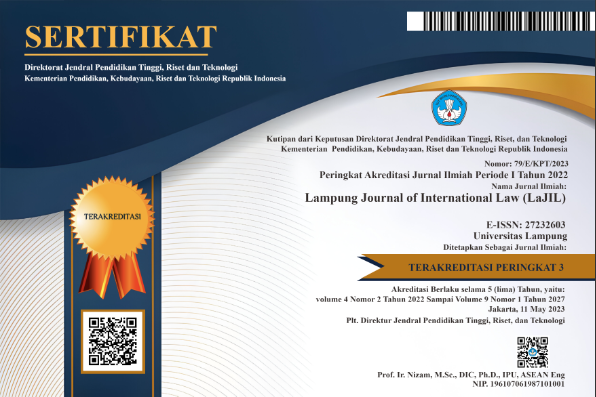Portuguese Imperial Building in the Kotte Kingdom of Sri Lanka as a Reflection of 16th Century International Law
DOI:
https://doi.org/10.25041/lajil.v5i2.2946Abstract
The role of colonialism in shaping international law has been a contentious issue among legal scholars, who overwhelmingly view international law as a tool of imperialism. This paper describes the 16th-century interactions between the Portuguese and Sri Lanka, which served as early instances of an international legal system biased towards European interests. The practices adopted by the Portuguese in Sri Lanka during their engagements with the Kotte kingdom represent early instances of unequal treaties, the undermining of sovereignty, and the imposition of "puppet rulers." This paper critically examines these practices in the context of the evolution of international law during the 16th century.
Keywords:
Sri Lanka, Kotte, Portuguese, Sovereignty, KingdomReferences
Hugo Grotius De Iure Belli ac Pacis Libri Tres (1646), trans. Francis W. Kelsey (1925), Book I, Ch. 3, Section VII, 1, 3, 7.
Marti Koskenniemi, Empire and International Law: The Real Spanish Contribution, University of Toronto Law Journal, Vol.61, No.1
Disney, The Portuguese in India and other Studies, 1500–1700; Subrahmanyam, The Portuguese Empire in Asia, 1500–1700: A Political and Economic History; Thomaz, De Ceuta a Timor
Bastias Savendra, “Jurisdictional Autonomy and the Autonomy of Law: End of Empire and the Functional Differentiation of Law in the 19th Century Latin America.
George Winius, The Foundation of the Portuguese Empire, 1415-1580, University of Minnesota Press.
Marti Koskenniemi, Empire and the International Law: The Real Spanish Contribution, The University of Toronto Law Journal, Vol.61, No.1, ( 2011).
Lauren Benton , Lisa Ford, Rage for Order: The British Empire and the origin of International Law, Cambridge : Harvard University Press, 2015.
Zoltan Biedermann, The Matrioshka Principle and How it was overcome: Portuguese and Hapsburg Imperial Attitude in Sri Lanka and the responses of the Rulers of Kotte ( 1506-1598), Journal of Early Modern History, 13 (4), 2009.
Punsara Amarasinghe, Imperial Promise of Protection in the 19th century International Law: The Case of Kandyan Kingdom”, SOAS Law Review, Vol.2, No:1, 2020.
Antonio Hespanha, Early Modern Law and the Anthropological Imagination of Old European Culture”
Mudaliar Rasanayagam, Ancient Jaffna, Colombo: Caves, 1926.
V. Perniola, The Catholic Church of Sri Lanka: The Portuguese Period, Colombo: Thisara Publishers, 1984.
CG Perera, Dharmapala’s Gift to Franciscans, Journal of Royal Asiatic Society, Vol.54, 2008.
T.B.H Abeyasinghe, The Myth of the Malwana Convention, Ceylon Journal of Historical and Social Studies, Vol 7, 1964.
Alan Strathern, Kingship and Conversion in the 16th Century Sri Lanka, Cambridge: Cambridge University Press, 2010.
Gaston Perera, Kandy Fights the Portuguese: A Military History of Kandyan Resistance, Colombo: VYB, 2007.
A Anghie, Francisco Vittoria and the Colonial Origins of the International Law, Social and Legal Studies, Vol.5, No.3, 1996.
Irene Watson, Aboriginal Peoples, Colonialism and International Law, London: Routledge, 2015.
Marti Koskenniemi, Empire and International Law: The Real Spanish Contribution, University of Toronto Law Journal, Vol.61, No.1.
Marti Koskenniemi, Global governance and public international law, Jutiz, Vol.37:No.3, (2004).
George Winius, The Foundation of the Portuguese Empire, 1415-1580, University of Minnesota Press.
Lauren Benton , Lisa Ford, Rage for Order: The British Empire and the origin of International Law, Cambridge : Harvard University Press, 2015.
Alan Strathern, Theoretical Approaches to Early Sri Lankan History and the early Portuguese Period, Modern Asian Studies, Vol.38, No.1, (2004).
Zoltan Biedermann, The Matrioshka Principle and How it was overcome: Portuguese and Hapsburg Imperial Attitude in Sri Lanka and the responses of the Rulers of Kotte ( 1506-1598), Journal of Early Modern History, 13 (4), 2009.
V.L.B Mendis, The Roots of Sri Lanka’s Foreign Policy, South Asian Survey, Vol.1, No.1, 1991.
V.L.B Mendis, Foreign Relations of Sri Lanka, Tisara Publishers:Colombo, 1986
Rajavaliya, Trans : A.V. Suraveera, Thisara: Colombo, 1989.
Tikiri Abeyasinghe, Portuguese in Kotte, Colombo: Lake House, 1981
Sir Paul E Pieris, Ceylon the Portuguese Era, Cave: Colombo, 1913
Mudaliar Rasanayagam, Ancient Jaffna, Colombo: Caves, 1926.
V. Perniola, The Catholic Church of Sri Lanka: The Portuguese Period, Colombo: Thisara Publishers, 1984.
Downloads
Downloads
Published
How to Cite
Issue
Section
Copyright
Copyright (c) 2023 by the Auhtor(s) Published by Development Centre Research of Law and Scientific Publication on behalf of the Faculty of Law, Universitas Lampung
License

This work is licensed under a Creative Commons Attribution-ShareAlike 4.0 International License.







